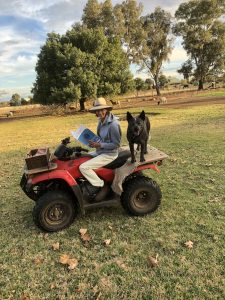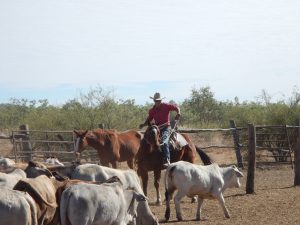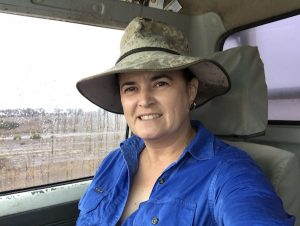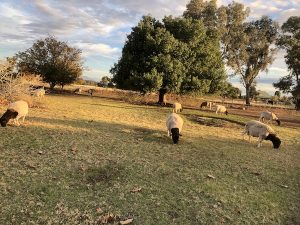Learning off the farm

Every afternoon farmer Jenny Flynn, 61, sits on her quad bike on the small acreage she runs with her husband near Narrabri, keeping an eye on the sheep while she studies for her new career in aged care. ‘Sometimes I have to put my books down and chase the sheep away from my roses but I’ve got a lot of work done that way.’
Jenny’s one of a growing group of farmers who are enrolling in courses at Community College Northern Inland in north west NSW as part of a state government initiative to assist drought-affected families to retrain and find work off the farm.
Jenny’s part way through a Certificate III in Aged Care but she already has a job working as an Assistant in Nursing at a nearby residential aged care facility. Jenny and her husband have struggled through the worst drought in 80 years.
‘If I didn’t have a job we would have had to sell up. The course saved us.’
Jenny started work at 17 in a pharmacy, then spent 24 years working in a jewellery shop. In 2007, aged 50, the drought started and she was laid off. ‘Jewellery is the last thing people buy in a drought.
‘For the past 12 years I’ve been job hopping. I’ve had high pressure admin jobs at the coal mine where I worked really hard and got everything done by the deadline. But there’s no stability anymore. You get a job and then the contract finishes and you’re out of work again.
‘I got very depressed. We had no money, there was no feed for the sheep and there were times when I couldn’t afford the fuel to drive to town to look for work. So when I heard this course would almost guarantee me a job, I decided to do it.
‘At first the idea of going back to study sounded hard. But I’ve had to keep up with technology and I think I’m pretty smart. I’ve kept my brain active doing crosswords and sudoku.
‘But the course is great. I’m really enjoying it. It’s not like studying, it’s learning.’
Farmers enjoying learning
Alison Heagney, CEO of Community College Northern Inland, said farming families now view the College in a new light.
‘Most of the farmers around here thought of our
‘They are very engaged and very motivated learners although many have had negative experiences of schooling in the past.
‘They enjoy opportunities to socialise too, going out for coffee together or cooking for the group. And distance isn’t an obstacle. It’s nothing for locals round here to drive 100 km to get the groceries. Some people might drive over 200 kms to class and we’ve got one farmer who flies in by plane.’
The College offers accredited training, foundation skills courses as well as non-accredited programs for hobby, leisure, health and wellbeing. Free taster sessions give an overview of new industries for those looking to explore opportunities for off farm income.
‘The drought has hit us really hard. It’s been quite devastating. It’s important that we find ways to support each other any way we can. And these classes have been a great way of doing that,’ Alison says.
‘We don’t know how long the drought will last so in the meantime we’re encouraging people to follow their interests and keep learning so that once the drought is over they’ll continue lifelong learning.’
‘The non-accredited courses are fun and there’s no assessment so that’s opened a lot of gates. Once people come along to those and find them enjoyable they are more likely to come along to accredited courses, which is great.’
Alison Heagney, CEO, Community College Northern Inland
Country campuses and tailored courses

The College has 7 campuses in small towns across the region and offers courses according to what experts are available and what farmers are interested in.
‘We’ve trained farmers, horticulturists, nurses and welding fabricators to run courses for us,’ Alison says.
One of those experts was Kylie Finlay. ‘When they asked me to do some teaching I was really interested – I was ready for a change of vocation and was keen to do something different.’
Kylie worked first as a registered nurse and more recently in a management position in an aged care facility as well as running a 6,000 acre farm with her husband. Teaching was a new challenge.
‘It was a bit daunting at first but I love it. The students are excited to learn. I love sharing my knowledge and I use lots of practical examples, talking about different experiences I’ve had to deal with and clients that I’ve looked after. The students find that really interesting.’
‘I absolutely love my new job, it’s the most rewarding thing I’ve ever done.’ Farmer Jenny Flynn

As for Jenny Flynn, who is one of Kylie’s students she is loving her new job.
‘I’ve never done anything so rewarding. I just love caring for people, looking after them, talking to them, helping them. There’s one lady who can’t talk but she talks with her eyes and the look in her eyes just makes me feel so good. I feel wonderful at the end of each day. It’s the best thing ever.
‘When I think of the other jobs I’ve done, I feel like I’ve wasted my entire life doing meaningless rubbish.
‘Now that I’ve got this job that I love, I’ll keep working as long as I can.’
See the full issue of Quest 2, 2019




































































































